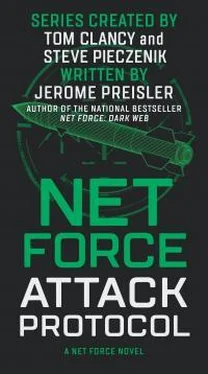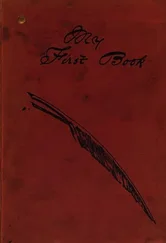“Do you know what’s going on?” she asked.
Mario peered through the binoculars. First at the band of drones in the orange-tinged sky, then the hedgehogs and armored vehicles below. They were on the move. Like on a game board. All of them, every piece.
Battle of annihilation , he thought. Where had he heard that term before? Maybe in a book or a video game or something. He wasn’t sure. But he knew it meant total war. When an army threw down all its chips in a single strike. When its goal was the complete destruction of an enemy and its resources.
“I think the bots want to destroy everything here,” he said. “Kill us all. Every last person on base.”
Laura was silent a moment. Then she took his hand. “Mario,” she said, “we should say a prayer.”
He hesitated.
“I guess,” he said. “But I don’t know the right one.”
She bowed her head slightly, then raised it. Angel de mi guarda, dulce compañía.
“I do,” she said.
The Pumas lumbered onto the parade ground. The hard, lumpy grass and soil were higher than the lip of the quadrangle’s pavement, and the transition from one to the other jarred the men in the C&C at the wedge’s rear.
Fernandez watched his monitors. They showed the drones spinning and swirling against the blackness of the sky like a funnel cloud.
Wasserman’s face paled.
“Sarge,” he said, “you see what they’re doing?”
Fernandez nodded but remained silent. About fifty yards up ahead, a large group of fliers had poured earthward in a perpendicular column, abruptly changed direction about six feet above the ground, and come shooting at the wedge parallel to the ground. After a split second, that horizontal line divided into three, some of drones peeling off to the left, others to the right, the main column continuing to bear toward the armored vehicles in a direct-intercept course. Their sound outside the Puma was like the roar of a freight train rushing into a station at full speed.
In the jump seat, Howard leaned forward and clapped a hand on Wasserman’s shoulder.
“Toy bees, kid,” he said. “Julio’s got our asses covered.”
Fernandez smiled a slight, grim smile. He hoped he would live to remember that.
Then suddenly, a new sound through the vehicle’s armor. A hissing, piercing whistle. Like a quarterback making a Hail Mary pass, Spree had fired an RPG at the lead Puma from behind the main column of drones.
Fernandez straightened in his seat. His displays showed the oncoming projectile’s tail of seething propellant gases as layered bands of thermal radiation on his screen—blue at the outer margins, then green, violet, red, orange, and yellow-white.
He drew a long, deep breath as the rocket came closerclosercloser and then veered away from the Puma at the last possible instant, as if hitting an invisible wall, as if skipping off glass, as if rebounding wildly off a comic-book force field, corkscrewing through the air like a fish on a hook and detonating far to the right a few heartbeats later.
“Woooo!” Fernandez was shouting and pumping his fists. “Wooo- hooo !”
He had time enough to let out a third loud, triumphant whoop before the pincering drones streaked toward the armored formation from three sides.
His heart kicked in his chest.
Come on, Foggy , he thought. Do it to ’em.
It did it, the FOG soft-kill jammer suite aboard all four Pumas literally creating an impenetrable, 360-degree electronic mist around them—a threat fog—its pinpoint lasers simultaneously frying the drones’ guidance systems and fooling their IR sensors into locking on to phantom targets. The fliers got no closer than the ’hog’s errant rocket before swerving off into the darkness.
Now Wasserman was also howling and fist-pumping with a mixture of giddy relief and exultation.
“Whoa!” he screamed. “Sarge the genius! Genius Sarge! ”
The wedge kept rolling forward, plowing through waves of dazzled, slewing drones. They looped and curled and wheeled around the Pumas in a kind of nihilistic aerial ballet, exploding as they struck the ground. The blasts shook the vehicles’ armored hulls but left them undamaged.
Fernandez felt flushed with adrenaline. It was like he was floating outside his body. He took another long breath to bring himself back down.
Then Howard leaned forward and thrust his arm between the two front seats, pointing his forefinger at the main dash display.
It showed Spree still advancing among the drones.
“Kill it, Genius,” he said. “Blow the shit out of it.”
Fernandez nodded.
“Pickles,” he said, “enable Percy One. Striker fire control. Lock and load.”
“Yes, Jules.”
The lead auton’s remote-weapons station was above the roof of its hull, where the manned gun turret was situated on Fernandez’s Puma. Designed for a wide range of medium and heavy armaments, it had been fitted with an Mk 47 Striker automatic grenade launcher, capable of firing a dozen low-recoil .40 mm smart rounds almost identical to those carried aboard the ’hogs.
At his control panel, Fernandez triggered the auton’s launcher just as Spree coughed a second RPG into the air. The projectiles passed each other flying in opposite directions, smoke trails puffing and undulating behind them like vaporous eels.
Blinded and diverted by the FOG’s electronic countermeasures, Spree’s grenade careened wildly off mark.
The auton’s did not and hit the ’hog midway up its squat, vaguely anthropomorphic chassis. Spree rocked and teetered backward on its treads, its center of gravity shifting from the impact, the front end of its base lifting six inches up off the snow.
A thousandth of a second before the round detonated, Spree registered that it had been fooled. Lured too close to take evasive action, while an unknown defensive system aboard the Puma caused its rockets to veer off course.
A millionth of a second after that, it transmitted the data to the other three hedgehogs over their neural network. It was the robotic equivalent of a warning cry, and it went out at the speed of light via an infrared wireless connection.
And then the round blew the ’hog to bits and pieces, engulfing it in a large teardrop of flame. Fragments of its metal body sailed through the air, clanging hard against the Puma’s armor panels.
Fernandez looked at his display, then half turned toward Howard.
“Shit’s blown,” he said.
The colonel grunted. He was staring into the displays.
“Move on at speed, Julio,” he said. “We’re getting our people out.”
The Pumas traversed the parade grounds at close to seventy miles per hour, swinging to the right several hundred yards before they reached the barracks. The remnants of the drone swarm—twenty or so fliers—had ceased their attack for now, pulled up into the darkness, and were stalking the wedge from overhead like nocturnal birds of prey.
The whole thing felt insane to Fernandez. But he had fought in several wars. Accepted the killings, the bombings, the blood, and the terrible loss. It had given him a powerful capacity for handling insanity, even when it surrounded him.
Steady at his controls, he passed the gutted husk of the barracks on his left. The building was still burning in spots, flames sprouting from its windows and dancing in the wind. The maintenance shed was just ahead of him, around the north end of the barracks.
Howard asked, “You got a fix on the rest of the ’hogs?”
Fernandez studied the monitors. “Nash has pulled pretty far north,” he said. “Same for Walt. It’s backed up west of the shed...all the way to the perimeter.”
“Earl?”
“Moving toward us from the civilian-housing area. Or what’s left of it. The ’hogs aren’t Indy racers. But it won’t take them long to get there.”
Читать дальше












